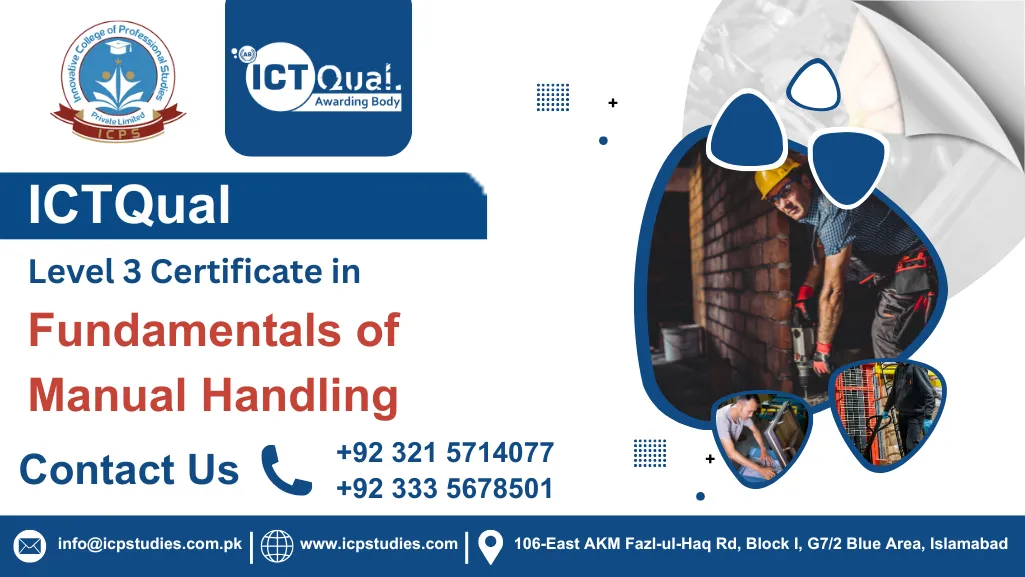In many industries, manual handling remains a daily necessity. However, improper handling techniques often result in workplace injuries, lost productivity, and legal implications. The ICTQual Level 3 Certificate in Fundamentals of Manual Handling offers a structured and professionally recognised qualification aimed at reducing these risks through knowledge and safe practice.
This course is designed for individuals and employers who prioritise health and safety, aiming to equip staff with the essential principles of effective manual handling. Whether working in warehousing, healthcare, logistics, construction, or retail, this qualification supports a safer, more efficient working environment.
Manual handling involves lifting, carrying, pushing, or pulling loads, and poor technique can lead to musculoskeletal injuries and long-term health problems. UK legislation, including the Manual Handling Operations Regulations 1992, requires employers to minimise the risk of injury through proper training and assessment. The ICTQual Level 3 Certificate ensures that learners understand both the physical techniques and the legal responsibilities related to manual handling.
The ICTQual Level 3 Certificate in Fundamentals of Manual Handling is a valuable qualification for anyone involved in physical work. It supports both personal career development and organisational risk management by fostering safe handling practices rooted in legal compliance and practical knowledge.
All About ICTQual Level 3 Certificate in Fundamentals of Manual Handling
Course Overview
The ICTQual Level 3 Certificate in Fundamentals of Manual Handling is a practical and industry-relevant qualification designed to enhance workplace safety and reduce the risk of injury. This course provides a comprehensive understanding of manual handling principles, techniques, and legal requirements in line with UK health and safety standards. It is ideal for individuals working in physically demanding roles across sectors such as construction, logistics, healthcare, and retail.
Learners will gain the skills needed to identify manual handling risks, apply safe lifting and carrying techniques, and conduct effective risk assessments. The course also covers ergonomic practices and strategies for minimising strain and injury in the workplace. With a strong focus on compliance with the Manual Handling Operations Regulations 1992, it prepares learners to contribute to a safety-first environment.
Delivered through flexible online or blended learning formats, this qualification is accessible to working professionals and employers looking to upskill their teams. Upon successful completion, participants receive a recognised certification that supports career progression and demonstrates a commitment to workplace health and safety.
Study Units
- Principles of Manual Handling and Risk Factors
- Legal Requirements and Workplace Responsibilities
- Safe Lifting and Moving Techniques
- Risk Assessment and Injury Prevention
- Use of Manual Handling Aids and Equipment
To enrol in the ICTQual Level 3 Certificate in Fundamentals of Manual Handling, applicants must meet the following entry criteria:
- Minimum Age: Learners must be at least 18 years of age at the time of registration.
- Educational Background: A basic secondary education is recommended. No formal qualifications are required, but a general understanding of workplace practices is beneficial.
- Work Experience: Previous experience in a manual handling environment is useful but not essential. This course is suitable for both new entrants and current employees looking to formalise their skills.
- Language Proficiency: As the course is delivered in English, learners must have a reasonable level of English reading, writing, and comprehension. Non-native English speakers should ideally have proficiency equivalent to IELTS 5.0 or above.
These entry requirements ensure that learners are prepared to engage with the training content and apply their knowledge safely and effectively in the workplace.
The ICTQual Level 3 Certificate in Fundamentals of Manual Handling is designed for individuals and organisations aiming to improve safety, compliance, and efficiency in physically demanding roles. This course is particularly suitable for:
- Warehouse and Logistics Staff
Individuals responsible for loading, unloading, and transporting goods in warehousing or distribution environments. - Construction and Maintenance Workers
Personnel involved in lifting and moving materials on construction sites or during repair and maintenance tasks. - Healthcare and Care Support Workers
Professionals who assist patients with mobility or frequently handle equipment and supplies. - Retail and Stockroom Employees
Staff engaged in stock movement, shelf-stacking, or deliveries within retail settings. - Manufacturing and Production Operatives
Workers operating in factories where manual handling is part of the daily routine. - Supervisors and Team Leaders
Those managing teams involved in manual handling, seeking to reinforce health and safety standards. - Job Seekers and Entry-Level Workers
Individuals aiming to improve their employability with a recognised manual handling qualification.
This course is ideal for anyone looking to gain practical skills, reduce injury risks, and comply with UK health and safety legislation.
Learning Outcomes
Principles of Manual Handling and Risk Factors
- Understand the basic principles of manual handling and how they apply in the workplace
- Identify common manual handling tasks and associated risk factors
- Recognise the impact of poor handling techniques on health and safety
- Develop awareness of posture, load limits, and body mechanics
Legal Requirements and Workplace Responsibilities
- Gain knowledge of key UK legislation related to manual handling, including the Manual Handling Operations Regulations 1992
- Understand the legal responsibilities of employers and employees in maintaining a safe working environment
- Identify the role of health and safety policies in manual handling operations
- Learn how to promote a culture of compliance and accountability
Safe Lifting and Moving Techniques
- Apply correct lifting, carrying, pushing, and pulling methods to reduce injury risk
- Understand the importance of preparation, balance, and positioning when handling loads
- Demonstrate practical techniques for handling different types of loads safely
- Recognise signs of unsafe practices and how to correct them
Risk Assessment and Injury Prevention
- Conduct basic manual handling risk assessments in various workplace settings
- Identify hazards and evaluate the severity and likelihood of injury
- Develop strategies to eliminate or control risks
- Learn preventive measures to minimise strain, fatigue, and long-term injuries
Use of Manual Handling Aids and Equipment
- Understand different types of manual handling aids, including trolleys, hoists, and lifting straps
- Evaluate the suitability of handling equipment for specific tasks
- Learn safe operating procedures for manual handling tools
- Promote the use of mechanical aids to reduce physical effort and improve safety
FAQs ICTQual Level 3 Certificate in Fundamentals of Manual Handling







